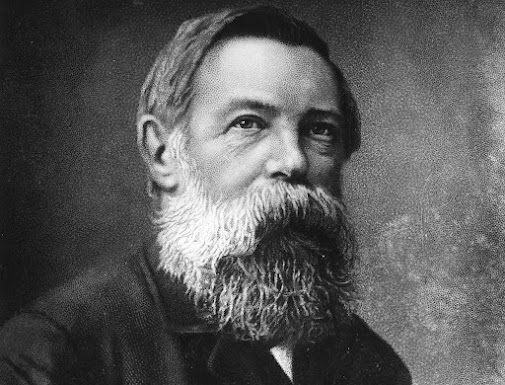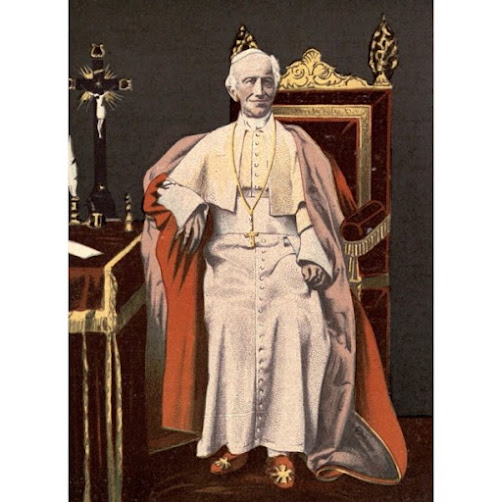Was Atheist Communism a Type of Religion? - "Atheism as Weltanschauung" from "Does God Exist?" by Hans Kung
Atheism as Weltanschauung: from Engels to Lenin
This section from Hans Kung's book, Does God Exist? An Answer for Today, deals with the concept of "Weltanschauung." This is one of the key concepts that I am exploring for my masters thesis. It is the German word for what we might call a "worldview." It is the whole milieu through which one views reality. The set of beliefs about the most fundamental question in life. So Kung reflects on the loss of the Christian worldview in the 19th Century, and makes a connection to the rise of Marxist -Leninism. Marx, Engels, and Lenin all rejected religion as a type of "alienation." They saw it as man failing to understand the workings of the material world, projecting natural laws into a divine being, and then rejecting his earthly life to sacrifice himself for this imaginary being. Yet, and this is where Kung is so interesting, when Christianity is persecuted and removed from society, does not atheism just become a new type of religion which takes its place? Instead of God's creation, they replace it with "dialectical materialism." They themselves do not understand the workings of the world, and thus their own explanations that they posit for the forces of reality are even more simplistic. It has always struck me as childishly simplistic to claim to explain all of history with the idea that its a struggle between the oppressed and the oppressor, or the higher and lower classes. Even more than that, it seems to me to be arrogance to then claim that if only we had complete governmental control of all aspects of human life, we could usher in the utopia.
Was Communism a Type of Religion?
Kung beings this section by pondering why Karl Marx did not finish his work, Das Kapital. The traditional view was that he got sick and was prevented from finishing, but Kung seems unconvinced. He asks whether it was also the case that Marx saw a failure in his work, as according to Marx's own theory the economically industrialized England should have been the first staging ground for the worker's revolution, yet it was not. While having a part in the beginnings of some Communist groups, he did not succeed in England, and was estranged from Germany, leaving a gap between the many followers he had amassed and any type of practical action. 1
Kung argues that in the place of this lack of action Marx instead provided more theory for his followers. Marx provided a whole worldview which embodied the Communist mind. "The more the advent of socialist revolution was delayed, however, and an all-subverting revolutionary project seemed impossible, the more the need of a theoretical substitute became evident: a binding doctrine, comprehensive teaching, an all-embracing Weltanschauung. And the more the workers' movement at the same time - in Germany especially after 1870 - as a part of millions of men, became organized and consolidated, the more it needed not only organizational but also ideological integration and strengthening by a common Weltanschauung." Where were the core ideas which made up this worldview? Of course, it was those ideas of dialectical and historical materialism [A seeming synthesis of the Hegelian view of history with the Darwinian Naturalism, how fun].
Another major work which contributed to this Weltanschauung was Engels work Herr Eugen Duhring's Revolution in Science. This was a publication aimed at criticism of a lecturer in Berlin at the time, though it was the more universal ideas of the work that also became a backbone of the Communist worldview. It "... became in effect the program of dialectical materialism (Diamat) as a universal Weltanschauung." In Engels work he probed both the disciplines of the natural sciences, as well as the study of the history of religion, to support this view of dialectical materialism. "With reference to the critique of religion, Engels went beyond Marx in two respects: he looked for support from the natural sciences, regarding theories such as that of the conservation of energy and especially Darwin's discovery of the evolution of species as a splendid confirmation of Marx's discovery of the law of the material evolution of society; he looked for support from the history of religion, regarding ethnological studies on primitive religion as helpful in conforming historical materialism."
Kung then provides some interesting quotes from this work by Engels. In the first of which, Engels claims that religion is simply the personification and projection of the forces of nature that controlled man's life. Turning earthly influences into divine realities. He claims that comparative mythology will show this to be the case. Here we have the forces of nature acting on man. 2
 |
| Engels |
Secondly, Engels claims, the forces of history begin to work on man in a similar manner. Social dynamics and the manifestation of aspects of human psychology get personified into religious forces as well which have shaped man's history. The next step in human evolution, for Engels, was when man took these varied forces as gods, and then brought them together into one God, and personified him as the unity of all forces, including being a reflection of our psychology. Engels says, "In this convenient, handy and universally adaptable form, religion can continue to exist as the immediate, that is, the sentimental form of men's relation to the alien, natural and social, forces which dominate them, so long as men remain under the control of these forces." Here we can see the use of the word "alien" by Engels to represent that which we cannot understand and so we project it into a false reality which dominates us for a time ... until we realized that it's not real. This is directly connected to Marx's use of the term "alienation" in his earlier philosophical essays. It is the same idea, Marx claims that it is religion that alienates man from his true self and his true nature.
Engels then moves to the idea that Capitalism creates forces that we cannot control or understand, likewise bringing the "alien" in to dominate man, instead of man choosing to dominate it and take control over his destiny. "It is still true that man proposes and God (that is, the alien domination of the capitalist mode of production) disposes." Man must propose and dispose according to his own design and control. When he does accomplish this, when he takes complete control of the means of production and usage, religion and alienation will disappear, according to Engels. "... only then will the last alien force which is still reflected in religion vanish; and with it will also vanish the religious reflection itself, for the simple reason that then there will be nothing left to reflect." 3
A friend of Marx and Engels, philosopher Joseph Dietzgen, made a comparison between the new socialism and the old Christian Church. Socialism or Communism is the new, and only true, religion because it provides salvation for man here on earth. In his mind, it is not based in an other worldly fantasy, but in the most correct sense of earthly success and equality. The Weltanschauung of Marxist atheism is the new religion. Here's a quote from Dietzgen, "Yes, social democracy is the true religion, the only saving Church, in as much as it strives after the common goal, no longer by way of fantasy, no longer with petitions, desires, sighs, but in a real and effective way, really and truly, by the social organization of manual and mental work ... Social democracy lives in faith in the victory of the truth, in hope of redemption from material and mental bondage, in love for men's equality." In summarizing this, Kung then puts it this way: "Here is becomes clear how much the Marxist Weltanschauung serves in practice as an atheistic substitute for religion or an atheistic substitute religion. At the same time, the content of this explicitly materialistic Weltanschauung agrees to a surprising extent with the likewise materialistic and not (as required by the scheme of historical materialism) idealistic Weltanschauung of the 'bourgeoisie.'"
Later on, Kung points out, when religion did not necessarily simply disappear on its own as Marx and Engels predicted, others like Lenin saw the religious worldview, or Weltanschauung, as something threatening. Lenin severely hated religion, not simply holding that it was a refuge for the poor to dull their pain, but that it was a drug handed out on purpose by previously rulers to enslave their people. Waking up the this fact was the first step in breaking the addiction. 4
 |
| Pope Leo XIII |
"Even at that time, then, Lenin had demanded from his supporters a coherent atheistic Weltanschauung. As far as the state is concerned, religion is indeed a private affair. But it is not at all so for the party, one of the objects of which 'is precisely to fight against all religious deception of the workers.'" First and foremost, for Lenin, the importance of revolution was at a deeper level even than religion, it was the class struggle. Here, a quote from Lenin: "A union in that genuinely revolutionary struggle of the oppressed class to set up a heaven on earth is more important to us than a unity in proletarian opinion about the imaginary paradise in the sky." Lenin spelled out more of his thoughts on religion in a work called, Materialism and Empiriocriticism. Kung points out, though, that there is a particular letter than Lenin sent to a man named Maxim Gorky in which he most vehemently expresses his hatred for religion. Kung mentions that the leap from hatred to persecution ... was a short one. 5
Concluding this section, Kung mentions an encyclical, Quod Apostolici Muneris, which Pope Leo XIII wrote in 1878 addressing his concerns with this whole trend ... "... the 'plague' of socialism, which was working for the overthrow of society, rejecting all existing laws, all authority, all subordination and inequality, and even the marriage bond and the right of ownership ..." 6
Maybe I will explore that encyclical next ... stay tuned.
------------------
1 - Kung, Hans. Does God Exist? An Answer for Today. Doubleday & Company (New York, 1980). Pg. 236
2 - 237
3 - 238
4 - 239
5 - 240
6 - 241




Comments
Post a Comment